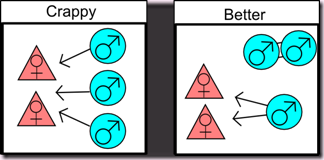It really perplexes me as to why we use the words "gay" and "straight," or any synonyms there-of. Why do we classify sexuality into categories of "like the same sex" or "likes the opposite sex"? These seem unnecessarily convoluted and weird. We use the same words to describe a man who likes men, as we do for a woman who likes women. We call both these kinds of people "gay," yet they seem like the complete opposite in their preference.
A few years ago, I decided to stop, or at least limit, using reflexive terms for sexuality (previous post aside). It just makes so much more sense to me to describe someone as "liking women" or "liking men" rather than "liking their own sex" or "liking the opposite sex." After all, you're supposed to be describing what kind of person someone is attracted to; you shouldn't muddle it up by using phrases that are based off of what kind of person they are.
It's like, if you decide to have dinner with a friend and you ask them what kind of food they're in the mood for, and then they answer, "the same kind of food I had last night." When you ask someone a direct question, ideally they should give a direct answer, not one relative to some other bit of information. "Mexican food," is a better answer than, "the same kind I had last night." In the same way, "I like women," is a better answer than, "I like people of my own sex."
Unfortunately, I'm still definitely a minority in using this system. There aren't any convenient, monosyllabic words that I can use to describe someone as liking men or liking women. I could make some up, but people would have no idea what I'm talking about, and if they asked I'd basically have to explain my who position on reflexive language to describe sexuality. And I'm not very fond of using made-up words to shoe-horn my opinions and rants into conversations. I guess the words "virisexual" and "gynosexual" are accurate, but they're way too long for everyday use, and still have the same probably of people having no idea what I'm talking about.
Maybe I'm being overly-logical about this whole thing, but there are other reasons that it would be nice if people adopted non-reflexive language about sexuality. For instance, if use the same word to describe a man liking men as we use for a woman liking men, then it might help us to see (at least subconsciously) that these attractions are not so different. Non-reflexive language would better highlight the inherent sexism in saying that it's okay for women to like men, but not okay for men to like men, or visa versa. I wont go as far as to say that our system of language is what allowed homophobia to take root in society, but I certainly think it made it easier.
I’m not saying that we should totally throw out the words “gay” and “straight”; they are still useful when speaking in a broader sense, and you’re using the word to describe both lesbians and gays, or both straight women and men. However, when you’re talking about a specific person’s sexual preference, it just makes so much more sense to me to use non-reflexive terms for sexuality.
Of course, this whole rant doesn't really apply to the phrase "bisexual" (or "pansexual"), because it already describes a person’s sexual preference, without relation to their own sex.

